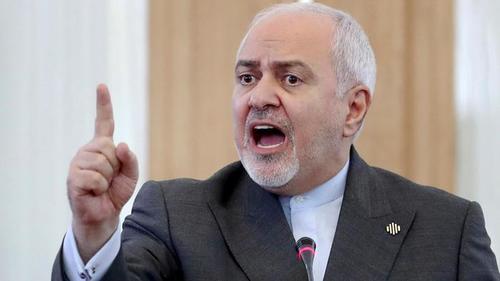Zarif-Gate Leak Causes Shake-Up In Iran's Presidential Office As FM Expresses 'Regret'
This week's 'Zarif-Gate' audio leak has caused a shake-up in Iran's presidential office, reportedly leading to the resignation Hessameddin Ashena, head of the Strategic Studies Center (a think tank closely associated with the Iranian presidency), as he was present during the interview with Zarif. The top Iranian diplomat had essentially said it was the military leadership that sets policy.
"Hesamodin Ashena of the Center for Strategic Studies resigned over 'the theft' of the three-hour tape of Foreign Minister Mohammad Javad Zarif being interviewed at the CSS," AFP reports Thursday. "Ashena, who held the post of Iranian deputy intelligence minister in the 2000s, has headed the center since 2013 and also serves as adviser to President Hassan Rouhani."
But it's not enough for Islamic hardliners representing the clerical and military establishment, who are now calling for Zarif to step down immediately, also given his remarks were taken as disparaging toward the late "national hero" Soleimani.

The interview, which was reportedly captured months ago and was never meant to be made public, included Zarif speaking with surprising frankness and criticism toward the role of the Islamic Revolutionary Guard Corps (IRGC) in the Islamic Republic. He bluntly admitted, for example, that the powerful IRGC often overrides government decisions and that the late Quds Force chief Qassem Soleimani's actions often harmed diplomacy. Even Iranian newspapers described the leak as a major "scandal" which embarrassed Iran on the world stage at a moment of "progress" at the Vienna nuclear talks.
In his first public comments since the scandal, Zarif said in an Instagram post that he's committed to "protecting the interests" of the country and Iranian people. He expressed regret, but stopped short of a direct apology:
"I am very sorry how a secret, theoretical discussion about the necessity of increasing cooperation between diplomacy and the field (the Guard) — in order for the next officials to use the valuable experiences of the last eight years –- became an internal conflict," Zarif wrote.
"I did not censor myself, because this is a betrayal of the people," he added.
"I have always been subject to the policies approved by the country and I have strongly defended them. But in expressing my expert opinion, I have considered seeking forgiveness, appeasement, and self-censorship as betrayal," he said, essentially suggesting it was the leak itself that was a betrayal.
“Zarif also says that by assassinating [Soleimani] in Iraq, the United States delivered a major blow to Iran, more damaging than if it had wiped out an entire city in an attack.” https://t.co/J7tFMnspzg
— Josh Kraushaar (@HotlineJosh) April 26, 2021
While the widespread international coverage of the leaked tapes triggered a firestorm of debate within Iran which in typical fashion pitted the Islamic hardliners against 'moderates' (Zarif and Rouhani are widely seen within the "moderate" camp that seeks engagement with the West), it appears the Iranian top diplomat's job is safe, for now.
There's speculation that the leak was intended to sabotage Vienna talks, which is viewed by deep suspicion within the Iranian hardliner political camp - particularly represented in parliament and among the Shia clerical establishment.
https://ift.tt/3aORPC3
from ZeroHedge News https://ift.tt/3aORPC3
via IFTTT




0 comments
Post a Comment